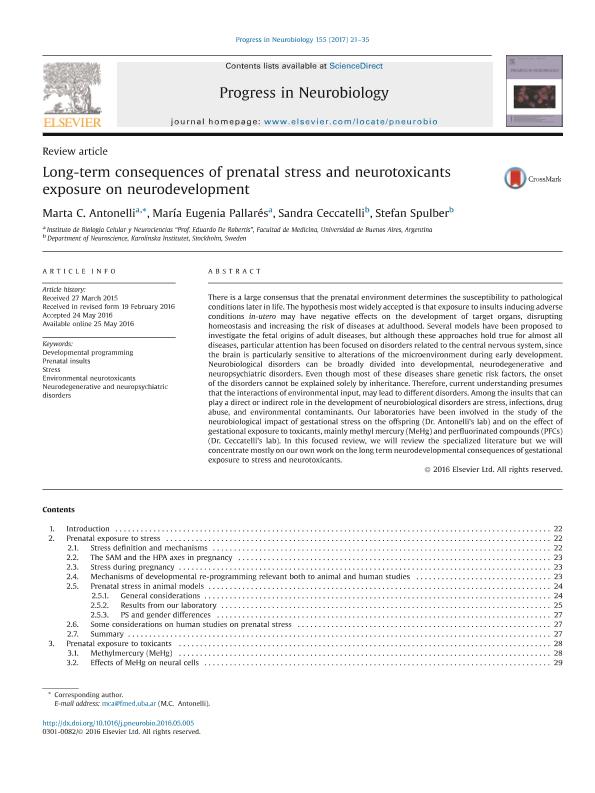Mostrar el registro sencillo del ítem
dc.contributor.author
Antonelli, Marta Cristina

dc.contributor.author
Pallares, Maria Eugenia

dc.contributor.author
Ceccatelli, Sandra
dc.contributor.author
Spulber, Stefan
dc.date.available
2018-06-01T20:09:18Z
dc.date.issued
2017-08
dc.identifier.citation
Antonelli, Marta Cristina; Pallares, Maria Eugenia; Ceccatelli, Sandra; Spulber, Stefan; Long-term consequences of prenatal stress and neurotoxicants exposure on neurodevelopment; Pergamon-Elsevier Science Ltd; Progress In Neurobiology; 155; 8-2017; 21-35
dc.identifier.issn
0301-0082
dc.identifier.uri
http://hdl.handle.net/11336/47043
dc.description.abstract
There is a large consensus that the prenatal environment determines the susceptibility to pathological conditions later in life. The hypothesis most widely accepted is that exposure to insults inducing adverse conditions in-utero may have negative effects on the development of target organs, disrupting homeostasis and increasing the risk of diseases at adulthood. Several models have been proposed to investigate the fetal origins of adult diseases, but although these approaches hold true for almost all diseases, particular attention has been focused on disorders related to the central nervous system, since the brain is particularly sensitive to alterations of the microenvironment during early development. Neurobiological disorders can be broadly divided into developmental, neurodegenerative and neuropsychiatric disorders. Even though most of these diseases share genetic risk factors, the onset of the disorders cannot be explained solely by inheritance. Therefore, current understanding presumes that the interactions of environmental input, may lead to different disorders. Among the insults that can play a direct or indirect role in the development of neurobiological disorders are stress, infections, drug abuse, and environmental contaminants. Our laboratories have been involved in the study of the neurobiological impact of gestational stress on the offspring (Dr. Antonelli´s lab) and on the effect of gestational exposure to toxicants, mainly methyl mercury (MeHg) and perfluorinated compounds (PFCs) (Dr. Ceccatelli´s lab). In this focused review, we will review the specialized literature but we will concentrate mostly on our own work on the long term neurodevelopmental consequences of gestational exposure to stress and neurotoxicants.
dc.format
application/pdf
dc.language.iso
eng
dc.publisher
Pergamon-Elsevier Science Ltd

dc.rights
info:eu-repo/semantics/openAccess
dc.rights.uri
https://creativecommons.org/licenses/by-nc-sa/2.5/ar/
dc.subject
Developmental Programming
dc.subject
Environmental Neurotoxicants
dc.subject
Neurodegenerative And Neuropsychiatric Disorders
dc.subject
Prenatal Insults
dc.subject
Stress
dc.subject.classification
Salud Ocupacional

dc.subject.classification
Ciencias de la Salud

dc.subject.classification
CIENCIAS MÉDICAS Y DE LA SALUD

dc.title
Long-term consequences of prenatal stress and neurotoxicants exposure on neurodevelopment
dc.type
info:eu-repo/semantics/article
dc.type
info:ar-repo/semantics/artículo
dc.type
info:eu-repo/semantics/publishedVersion
dc.date.updated
2018-06-01T19:23:51Z
dc.journal.volume
155
dc.journal.pagination
21-35
dc.journal.pais
Estados Unidos

dc.journal.ciudad
New York
dc.description.fil
Fil: Antonelli, Marta Cristina. Consejo Nacional de Investigaciones Científicas y Técnicas. Oficina de Coordinación Administrativa Houssay. Instituto de Biología Celular y Neurociencia "Prof. Eduardo de Robertis". Universidad de Buenos Aires. Facultad de Medicina. Instituto de Biología Celular y Neurociencia; Argentina
dc.description.fil
Fil: Pallares, Maria Eugenia. Consejo Nacional de Investigaciones Científicas y Técnicas. Oficina de Coordinación Administrativa Houssay. Instituto de Biología Celular y Neurociencia "Prof. Eduardo de Robertis". Universidad de Buenos Aires. Facultad de Medicina. Instituto de Biología Celular y Neurociencia; Argentina
dc.description.fil
Fil: Ceccatelli, Sandra. Karolinska Huddinge Hospital. Karolinska Institutet; Suecia
dc.description.fil
Fil: Spulber, Stefan. Karolinska Huddinge Hospital. Karolinska Institutet; Suecia
dc.journal.title
Progress In Neurobiology

dc.relation.alternativeid
info:eu-repo/semantics/altIdentifier/doi/https://dx.doi.org/10.1016/j.pneurobio.2016.05.005
dc.relation.alternativeid
info:eu-repo/semantics/altIdentifier/url/https://www.sciencedirect.com/science/article/pii/S0301008216300545
Archivos asociados
